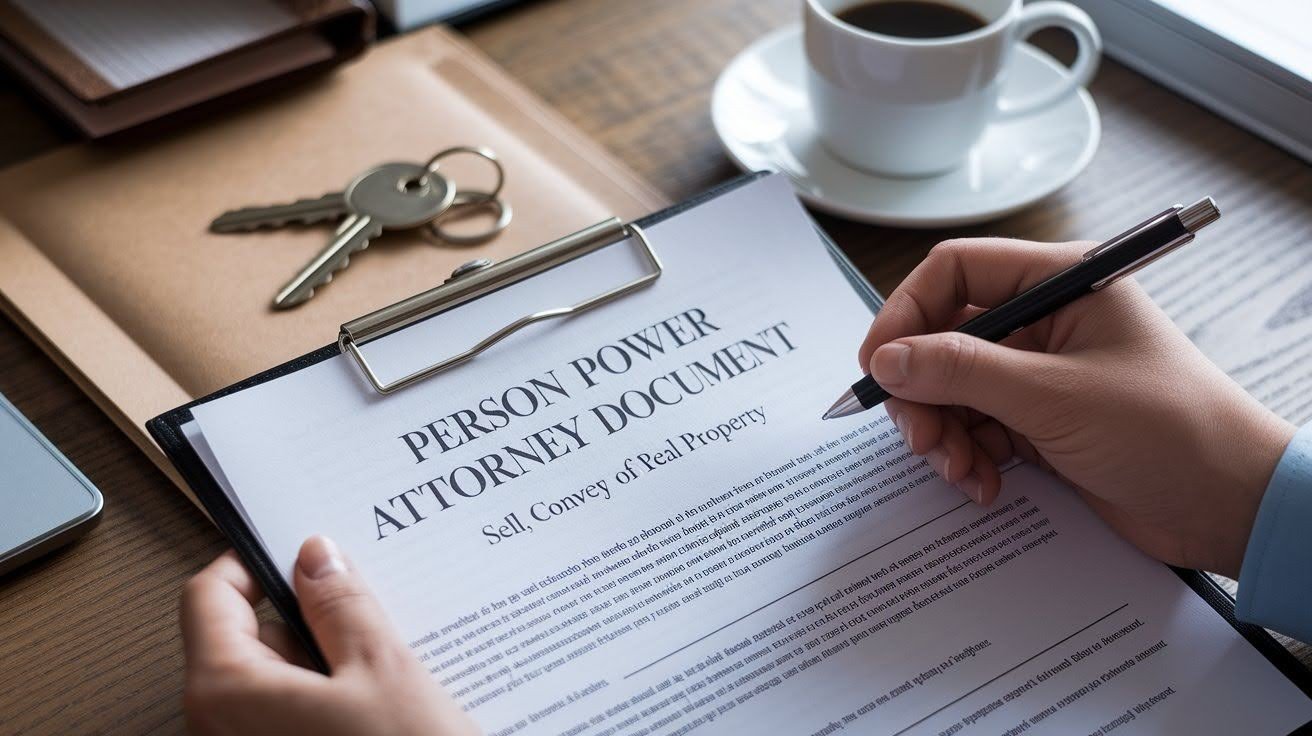This can be a lot to take in when your parents have had to get rid of their house and go to a nursing home, or have lost the ability to care for their home.
A quick note here is that yes, your parents could give you a POA to sell their house, but that doesn’t mean you could just sign where it says to and be done. There, special provisions need to be made with regard to real property.
Knowing what you are doing will save you time, money, and aggravation. This section provides links to articles on preparing a POA, preparing your house for sale, and the closing process. It then divides into “before” and “after”.
Can You Sell Your Parents’ House With Power of Attorney?
Yes, if you have the right legal authority, you can handle the sale on your parents’ behalf and make sure their home and wishes are protected.
Yes, but with specific conditions
You can sell your parents’ house if you hold a valid power of attorney. However, not every POA document gives you this authority. The document must specifically mention real estate transactions and property sales.
The key is having the right type of POA in place before you need it. Many families wait too long and face complications later. If your parent is still mentally capable, now is the time to set up proper documentation.
Can I sell my parents’ house with a power of attorney if the document is vague? No. The POA must use clear language about selling property. General statements about “managing finances” might not be enough.
What Type of Power of Attorney Is Required?
When it comes to selling your parents’ home, not every power of attorney will do. The document must clearly authorize real estate transactions. Without this, you can’t legally complete the sale.
A durable power of attorney is usually best because it stays valid even if your parents later face health or memory issues. This ensures you can continue managing their property when they need you most.
If your parents prefer tighter control, a limited POA focused only on real estate sales works well. It gives you the authority to sell the home without granting access to other personal or financial matters.
Three Essential Conditions That Must Be Met
Before you can sell your parents’ house using power of attorney, make sure these key legal conditions are in place to avoid delays or disputes.
The POA document must explicitly grant real estate sale authority.

To sell your parents’ home legally, the power of attorney must clearly state your right to handle real estate transactions. Vague wording like “manage finances” isn’t enough.
Look for specific phrases such as “sell, convey, or transfer real property.” This clarity ensures title companies and buyers recognize your authority without hesitation.
If you’re unsure, have an attorney review the document. A few missing words could delay or even block the sale of something no family wants when time and care are at stake.
Principal’s mental capacity considerations

Your parents must have been mentally competent when signing the power of attorney. If they were already experiencing memory or cognitive issues, the document could be challenged in court.
Timing is crucial when setting up the POA. While your parents are clear-headed ensures it will hold up legally when you need it most.
If there’s any doubt about capacity, a doctor’s evaluation can help confirm the POA’s validity and protect you from potential legal disputes.
Agent’s fiduciary duty requirements

As the agent, your responsibility is to act in your parents’ best interest, not your own. Every decision, including pricing and negotiating the sale, must benefit them financially.
You cannot sell the home to yourself or offer family members a discount, even if it seems helpful. This could be considered a breach of duty.
Keeping detailed records of all decisions and transactions is essential. Transparency protects both you and your parents and ensures the sale is legally sound.
Types of Power of Attorney
Choosing the right type of POA is crucial when helping your parents manage their property. The type you select determines exactly what you can do and when you can act on their behalf.
Durable POA
Durable POAs stay valid through incapacity, making them ideal for aging parents. You maintain authority even if your parent develops Alzheimer’s, has a stroke, or faces other cognitive challenges.
Without the durable feature, the POA becomes useless at the worst possible time. Most lawyers automatically include durable language in POAs for elderly clients.
If you’re reviewing an old POA, check whether it’s durable. If not, creating a new document while your parent is still capable makes sense.
Limited/Special POA for real estate
A limited POA focuses specifically on property transactions. This narrow scope gives you authority only for real estate matters, nothing else. Some parents prefer this because it limits how much control they’re handing over.
The agent can sell the house, but cannot access bank accounts or make healthcare decisions. This type works well when you just need to handle a property sale. It’s simpler and less intimidating for parents worried about giving up too much control.
Can I sell my parents’ house with power of attorney if it’s limited? Yes, as long as property sales are specifically included.
Springing POA
Springing POAs activate only when certain conditions occur, typically when a doctor certifies the principal is incapacitated. Until that trigger event, the document sits dormant. Your parent retains complete control over their affairs unless and until they cannot manage them anymore.
The advantage is that your parent doesn’t worry about premature loss of control. The disadvantage is that you need medical documentation before you can act.
This can cause delays when time-sensitive decisions arise. Some title companies are also wary of springing POAs and require extra verification.
General vs. Specific POA
| General POA | Specific POA |
| Covers a broad range of financial matters | Limited to particular tasks or transactions |
| Includes banking, investments, bills, and contracts | Might cover only real estate or a single property sale |
| Gives the agent wide authority | Restricts the agent’s powers to stated purposes |
| More comprehensive but potentially concerning for principals | Less intimidating for parents worried about control |
| May still need explicit real estate language | Clearly states the property sale authority |
| Good for overall financial management | Good for one-time transactions |
Steps to Obtain Power of Attorney for Selling Property
Getting the right POA in place requires careful planning and following your state’s legal requirements correctly.
Setting Up the POA Document
Hire a real estate or elder law attorney to draft your POA document. Online forms might miss important state-specific requirements.
Attorneys know exactly what language protects you and satisfies title companies. The cost is worth avoiding problems later.
Your lawyer will interview your parent to understand their wishes. They’ll explain the document in plain language so everyone knows what they’re signing. Professional guidance ensures the POA holds up under scrutiny when you need to use it.
Legal Requirements
To sell your parents’ house with power of attorney, the document must meet all state-specific legal rules. Skipping steps can delay the sale or create challenges with buyers and title companies.
Most states require notarization to confirm that your parents signed voluntarily and understood the POA. Some also ask for witnesses who aren’t family members to make the document fully valid.
In certain states, recording the POA with the county clerk is needed for real estate transactions. Even if optional, doing this adds extra protection and makes the sale smoother for you and your parents.
Witness requirements (state-dependent)
Some states require one or two witnesses in addition to notarization. These witnesses cannot be relatives or beneficiaries in most cases.
They must be adults who can verify that your parent signed willingly and understood the document. Your attorney will arrange appropriate witnesses if needed.
Witness signatures often need notarization, too. The rules vary by state and can get complicated. This is another reason working with a local attorney makes sense. They handle these requirements routinely and won’t miss any steps.
Recording with the county clerk’s office
Certain states require POAs related to real estate to be recorded (filed) with the county clerk or recorder’s office. Recording creates a public record that title companies can easily verify.
It also establishes the date the POA became effective, which matters for legal purposes. Even if recording isn’t required, it’s often smart to do it anyway.
The small filing fee provides extra protection and makes the sale process smoother later. Your attorney can handle the recording or tell you exactly how to do it yourself.
Making authenticated copies
Create several certified copies of the POA once it’s finalized. Banks, title companies, and real estate agents will all need copies.
Some institutions require “certified” copies with special stamps or notary certification. Regular photocopies often aren’t acceptable. Keep the original POA in a safe place,ce you might need it later.
Give copies to key people: your parents’ attorney, doctor, and financial institutions. Having copies ready prevents delays when you’re ready to sell the house.
Tips on Legal Protections
What agents cannot do, breach of fiduciary duty, and CFPB resources for elder protection:
- You cannot sell the property to yourself or family at below-market prices. This violates your fiduciary duty even if you think it benefits the family. The sale must be at fair market value to unrelated third parties. Self-dealing can result in criminal charges and lawsuits.
- You cannot use sale proceeds for personal benefit without explicit permission. The money belongs to your parent and must be used for their care and expenses. Taking funds for yourself, every reimbursement without clear documentation, can be considered theft or abuse.
- You must keep detailed records of all financial decisions and transactions. Document every expense, every decision, and your reasoning. If someone questions your actions later, records prove you acted responsibly.
- You cannot make decisions that benefit you at your parents’ expense. For example, selling the house quickly at a lower price because you’re tired of managing it violates your duty.
- The Consumer Financial Protection Bureau (CFPB) offers resources for elder protection. Visit their website for guides on POA responsibilities, preventing financial abuse, and reporting concerns.
Conclusion
Yes, you can sell your parents’ house under a power of attorney, but you must have the legal authority granted by the document and must be acting within your power of attorney.
Lastly, ensure that if you are POA, you are always acting in your parent’s best interest, getting as close to a fair market price as possible, documenting everything, and seeking advice. You must not mislead and must make appropriate decisions as a fiduciary.
Can I sell my parents’ house with power of attorney? Yes, thousands of families do it every year, indeed. It is wise to consult with a real estate attorney and an elder law attorney before pursuing this route. This ensures that your POA is valid and helps you navigate your state’s laws.
Frequently Asked Questions
Can I sell my parents’ house with power of attorney if they have dementia?
Yes, if the POA was signed before dementia affected their mental capacity. The POA must be durable and include explicit real estate authority. If no POA exists and they’re now incapacitated, you’ll need court-appointed guardianship instead, which is more complex and expensive.
What happens if I sell my parents’ house below market value using POA?
You could face legal consequences for breaching fiduciary duty. Family members might sue you for financial abuse or mismanagement. Courts can force you to pay the difference from your own funds.
Do both parents need to sign the POA for the house sale?
It depends on how the property is titled. If they own it jointly, both typically need to grant POA authority, or one needs authority from the other. Check the deed to see how ownership is structured. An attorney can review your specific situation and advise correctly.
How long does selling a house with POA take compared to regular sales?
Expect 30-60 days minimum, often longer than standard sales. Title companies need time to review POA documents thoroughly. Additional documentation and verification add delays. Lenders and buyers also require extra reassurance.
Can family members challenge a house sale made under a POA?
Yes, if they believe you acted improperly or breached fiduciary duty. Selling below market value, self-dealing, or lacking proper authority can trigger legal challenges. This is why documentation, transparency, and professional guidance are critical.







